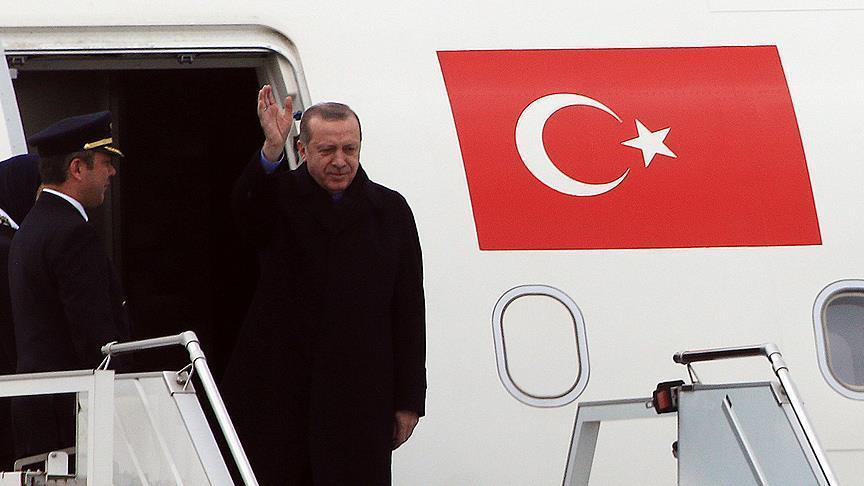ID :
474733
Sat, 12/23/2017 - 13:24
Auther :
Shortlink :
https://oananews.org//node/474733
The shortlink copeid
Erdogan to embark on 3-country North Africa tour

ANKARA
Turkey seeks to strengthen economic relations with African countries with President Recep Tayyip Erdogan's upcoming visits to Sudan, Chad and Tunisia, representatives of the country's Foreign Economic Relations Board (DEIK) have told Anadolu Agency.
The Turkish president will visit Sudan, Chad and Tunisia between Sunday and Wednesday.
Erdogan's three-nation tour will be very important for the development of Turkey's bilateral relations with these countries, according to DEIK.
The president will be accompanied by businesspeople as well as Turkish officials. The visit will be dominated by business forums to discuss investment and Erdogan is expected to sign cooperation deals in each state.
In Sudan, the businesspeople from Turkey are expected to conduct meetings related to investments in agriculture, whereas, in Chad, they will meet investors from the mining and oil sector, according to a statement issued by the DEIK.
Turkish companies will reportedly seek opportunities to benefit from the customs union agreement between Tunisia and other nations and investment opportunities in agriculture and tourism in the country.
Turkey's foreign trade with Sudan, Chad and Tunisia has developed significantly in the past five years. The total trade volume between Turkey and three African countries increased by 29 percent to $1.7 billion in 2016 while it was 1.3 billion in 2012, according to the Turkish Statistical Institute (TurkStat).
Turkey's total foreign trade with Sudan, Chad and Tunisia totalled $7.4 billion between 2012 and 2016, official data show.
- Turkish businesspeople eye higher trade volume with Sudan
The current trade volume of $500 million between Turkey and Sudan is not adequate for two countries that have such close relations, Mehmet Ali Korkmaz, the chairman of Turkey-Sudan Business Council of DEIK told Anadolu Agency.
Turkey's exports to Sudan amounted to $328.5 million in January-October 2017, while imports from the country stood at $78.3 million, according to TurkStat.
"The Turkish firms in Sudan operate in manufacturing, industry, energy, service, agriculture and machinery sectors and they help advance Sudan's economy by contributing to employment. We have Turkish firms that are ready to serve to Sudan in every field. We hope that this interest will continue to increase," he said.
- Tunisia provides incentives for foreign investors
Tunisia provides many incentives to attract foreign direct investment such as providing free land acquisitions in industrial zones, a tax exemption for 10 years, an exemption from insurance premiums for five years and free transfers of revenues, according to Ugur Dogan, the chairman of the Turkey-Tunisia Business Council.
Turkish Eximbank also provides low interest loans for Turkish investors in Tunisia, Dogan said, adding Tunisia sought to export more to Turkey.
Turkey's exports to Tunisia stood at $720.7 million in the first 10 months of the year, while imports from the country totalled $163.6 million, according to TurkStat.
The areas where investment is needed in Tunisia are the automotive supply industry, transportation, communication, agro-business, manufacturing industry and tourism, Dogan underlined.
- No Turkish banks in Chad
Chad presents opportunities for Turkish investors in construction, agriculture, food processing and storage, animal products processing, textile, machinery and energy, Can Hakan Karaca, the chairman of Turkey-Chad Business Council said.
Chad has rich gold, uranium and oil reserves, Karaca added.
Turkey's imports from Chad amounted to $26.9 million in the first 10 months of 2017 while exports stood at $14.9 million, according to TurkStat.
Karaca pointed out that the main problems for investors in Chad were inadequate energy and costly transportation infrastructure, weak institutions and corruption.
"Our president's visit to Chad shows Turkey's determination to strengthen the partnership between Turkey and Africa," he underlined.
Karaca said one of the main problems Turkish businesses faced in Chad was the lack of Turkish banks.





